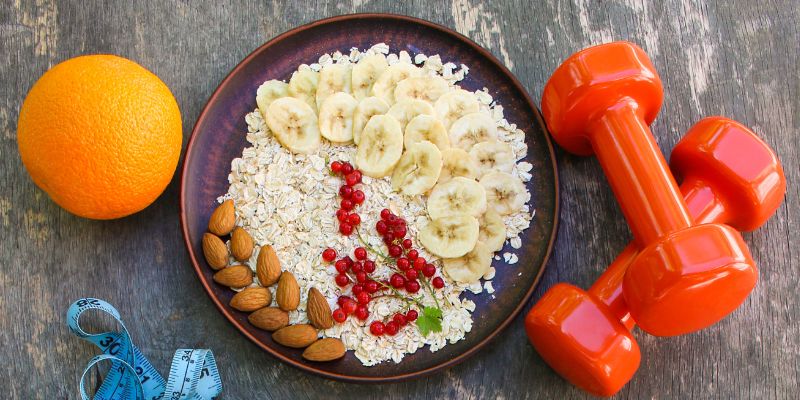Assessing the Benefits of a High-Protein Diet
Dec 19, 2023 By Nancy Miller
These days, a lot of people turn to high-protein diets as a means to an end—from losing weight to gaining muscle. The major goal of these eating plans is to increase protein consumption without sacrificing other necessary nutrients. A wide variety of biological processes rely on proteins, which are fundamental to the structure and function of muscles, organs, and enzymes. Some people think that eating a lot of protein will make you feel full faster and improve your health in general. Knowing the ins and outs of a high-protein diet is becoming more important as people become more health conscious and their eating habits change. To help you successfully and consistently follow a protein-rich eating regimen, this article explores the benefits, real-world uses, and factors to think about.

Nutritional Advantages of High-Protein Diets
There are several health advantages to maintaining a healthy lifestyle, and one of them is eating a diet high in protein. Proteins play a key role in tissue development and repair. For optimum muscle preservation and speedy body regeneration, a protein-rich diet is essential. The synthesis of hormones and enzymes, which aid in a wide range of physiological processes, also relies heavily on proteins. Studies have shown a link between protein consumption and an increase in bone density, which means that high-protein diets also help with bone health. In addition, following such a diet makes you feel full for longer, which means you won't eat as much and can better regulate your hunger, two factors that are critical to maintaining a healthy weight.
Impact on Weight Management and Muscle Growth
For both weight loss and muscle gain, high-protein diets are becoming more and more popular. These diets aid weight reduction by decreasing caloric intake and increasing fullness. A faster metabolic rate and easier weight reduction are benefits of consuming proteins rather than carbs and lipids because of the more energy required to metabolize proteins. Proteins provide the amino acids needed for muscle repair and development, which is especially significant for those who regularly participate in physical activities or strength training.
High-Protein Diets and Metabolic Health
Metabolic health is greatly affected by meals that are rich in protein. People with diabetes or insulin resistance may benefit from these diets because they can enhance glucose metabolism and help regulate blood sugar levels. Improvements in blood pressure and reductions in risk factors for cardiovascular illnesses have also been associated with increasing protein consumption. Overall heart health is significantly impacted by high-protein diets because they improve lipid profiles and lower LDL cholesterol. While these advantages might seem good, it's vital to remember that everyone's dietary requirements are different and that people should talk to their doctors before making any major changes to their diet.
Identifying Quality Protein Sources
If you want your high-protein diet to be healthy, you need to be sure you're getting it from good sources. Lean meats, fowl, shellfish, and dairy products are full in protein and offer all the amino acids your body needs. You can get extra minerals like iron, omega-3 fatty acids, and B vitamins from lean meats and seafood. Legumes, tempeh, tofu, and some grains, such as quinoa, are great alternatives for vegetarians and those looking for plant-based foods. Protein, fiber, vitamins, and minerals are all provided by them. Even though they have a greater fat content, nuts and seeds are great for your heart since they include protein and healthy fats.
Balancing Protein with Other Nutrients
Keep your diet well-rounded even when you increase your protein intake. A balanced diet rich in carbohydrates, lipids, vitamins, and minerals is also critical for good health. You should also include healthy fats like olive oil and avocados as well as whole grains. This equilibrium is important for sustaining energy, promoting digestive health, and facilitating nutrient absorption. The secret to a healthy and long-lasting high-protein diet is maintaining a balanced macronutrient intake.
Planning Protein-Rich Meals for Everyday Life
It takes careful preparation to include foods rich in protein into regular meals. Greek yogurt topped with berries and almonds or a veggie omelet are two possible breakfast alternatives. A turkey and avocado wrap or a salad with grilled chicken or chickpeas would be great lunch options. Grilled salmon, quinoa, and steamed veggies are some easy dinner options. Another simple dish is lentil stew. You can keep your protein intake up all day long with snacks like cottage cheese, hard-boiled eggs, or almonds. You can keep up this diet plan by making meals ahead of time and stocking up on protein-rich snacks. To ensure adherence and long-term success, it's important to choose protein-rich meals that you love and that fit into your lifestyle.

Suitability of High-Protein Diets for Different Individuals
The appropriateness of high-protein diets differs from person to person; there is no universally applicable formula. A high-protein diet may help athletes, particularly those who engage in endurance sports or strength training, to build and repair muscle. Because they make you feel full for longer, these diets may be useful for those trying to lose weight. It is important to exercise care while consuming a high-protein diet for those with certain medical disorders, since doing so may worsen their condition, such as renal disease. To counteract muscle loss, older persons may need a higher protein intake, but they must be careful not to overdo it. Before starting a high-protein diet, it's important to talk to your doctor about your specific health needs and objectives.
Potential Risks and How to Mitigate Them
There are certain hazards associated with high-protein diets, despite the fact that they have many advantages. A higher risk of cardiovascular disease, renal strain, and, in rare instances, bone loss from calcium leaching, may result from consuming an excessive amount of protein, particularly from animal sources. Choose lean protein sources and include plant-based proteins into your diet to reduce your risk of certain health problems. You may reduce your risk of nutritional shortages by including a variety of protein sources in your diet. This will guarantee that you obtain a range of other nutrients. A high-protein diet needs more water for metabolic processes and renal function, therefore it's crucial to stay hydrated.
Conclusion
With proper customization and balance, high-protein diets may be an effective tool for enhancing general well-being and reaching targeted fitness objectives. While planning a protein diet, it is essential to take into account one's unique health requirements and way of life in addition to consuming a range of high-quality protein sources. The full potential of protein-rich diets for improved health and a more energetic lifestyle may be realized when people carefully consider the pros and cons of these diets and incorporate them into their everyday lives.

Understanding Bok Choy - A Nutritional Powerhouse

Experience Tranquility: A Guide to MNDFL Meditation Practices

7 Reasons to Enjoy Peanuts in Winter But With Caution!

Walking for Health

How To Ensure Weight Loss With The Right Diet?

Foods to Avoid with Gout

Easy Workouts for Health and Weight Loss: A Comprehensive Guide to Fitness


